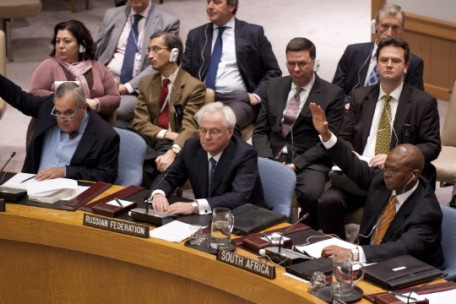The Last Entrenchment of Russia in the Arab World

The vetoing of the Security Council resolution on the Syrian crisis by Russia and China on Saturday, 4th of February 2012, was nothing unexpected. Russia had already shown its disinclination towards the resolution, despite the appeasing amendments. The Arab World’s representative made an enthusiastic defense of the resolution in the gathering of the fifteen Security Council member countries, later to follow up by slamming China and Russia for their negative vote. Before the voting session, Qatari Prime Minister Sheikh Hamad Al Thani, the current president of the Arab League and Nabil el-Araby, the General Secretary, prepared a critical report on the cooperation of the Syrian government with the League’s observers. Representing the majority of Arab states, they asked for the involvement of the Security Council against another Arab country, historically having merely one precedent: their support for military intervention against Libya and backing the Resolution 1973.
Another anti-Syrian resolution had already failed approval in the Security Council in October 2011. One can question why the Western Security Council member countries put the resolution to a vote while high-ranking Russian officials had not hidden their determination to thwart their efforts. To answer this question, Russia’s situation should be mapped according to the new give-and-takes in the Middle East: in the upheavals of the Arab World, Moscow has failed to occupy an effective role, despite the fact that all the uprisings aimed to overthrow West Puppets. The victory of Islamists in parliamentary elections and the long-awaited democracy in the Arab countries does not hold any promising messages for Russia in terms of its interests in the Middle East in the future, especially when other global powers are manipulating the uprisings in order to fit in their macro-framework of changing the political structure of the Arab World.
Among all of the crises, the only one enjoying Russia’s support has been the case of Libya, and the adoption of Resolution 1973 to establish a no-fly zone over the country. Nonetheless, against the Russians’ expectation, the West used this resolution as an opportunity to overthrow Gaddafi and to instigate war, a turn that taught Moscow to not allow adoption of a similar resolution against Syria. For Kremlin, Damascus is the last Arab entrenchment in its struggle with the West. Syria’s crisis has been sold to the Arab public opinion such that standing by Bashar al-Assad and the Syrian regime is tantamount to a loss of credit.
Although the Arab World has been polarized since the start of the Arab Spring, in Syria’s case, there is a relative consensus among the Arabs and apart from a certain sector of the Iraqi government supporting the Syrian president’s stay in power, the Arab street and its rulers support Assad’ removal. No wonder the Arab League has fallen at the full helm of Qatar.
The lack of self-restraint by the Syrian security forces, reflected in the high number of casualties has caused strong dissatisfaction among the Arab public opinion. Russia and China have bought the anger of the Arabs for vetoing the Security Council resolution and will be recognized as accomplices in continuation of the violence in Syria, a fact that will negatively impact the relations between these two countries and the Arabs World, especially the newly established Arab regimes. With Libya and Syria, the two countries sustaining good relations with Russia even after the Cold War, in crisis, the Arab uprising may be regarded as the end of Moscow’s influence in the Middle East. Nine years ago, Russia lost its stature and interests in Iraq after the fall of Saddam Hussein; but Kremlin’s unrelenting support for Bashar Assad and the Ba’ath party will more substantially threaten its position in the Arab world.
China, the next global power with extensive interests in the Middle East, has also created angst inside Western political circles by supporting Russia’s veto. The US, in particular, is worrying about the spread of China’s domination over the Middle East. Beijing has significant economic interests in the Arab World which the West is trying to curb. Most likely, the more democratic regimes of the Arab World will diversify their foreign relations and move for a balance between the West and the East. The Syrian crisis and Russia and China’s positions can postpone this probable decision of the Arabs for a long time, keeping up the good strategic and political relations between the Arab regimes and the West.
While the anti-Syrian resolution has failed enforcement, the complicated equation can hardly be reduced: the West may have not obtained its desired result, but definitely China and Russia cannot consider themselves as winners either. With the stalemate in the Security Council, Arabs and the West may tend to use solutions outside the UN, as the large number of casualties in Syria and demands of the Arab League have prepared the global public opinion to accept tougher solutions. The tsunami of the Arab uprisings that has passed through the Mediterranean Sea and reached the coast of the Persian Gulf and the Red Sea faces a deadlock in Damascus. What is certain is that the solutions for Syria are surely different from those adopted in Tunisia, Egypt, Libya and Yemen. It is not that probable that the West and the Arabs be able to eliminate the ruling actors and transfer power to the Syrian opposition.

